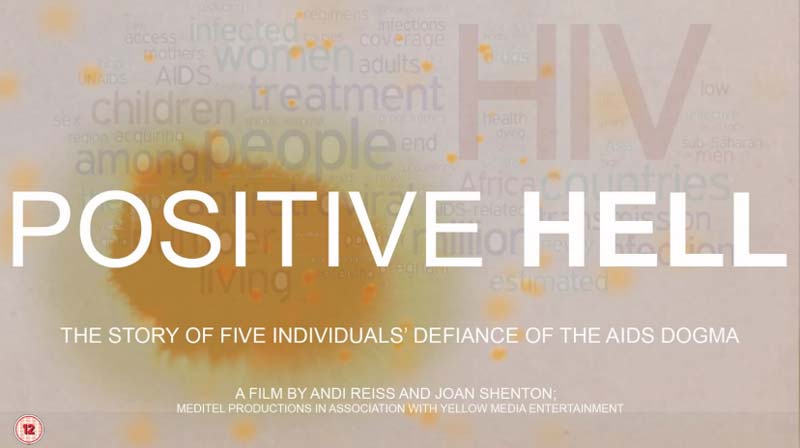[vc_row][vc_column][vc_single_image image=”90233″ img_size=”full” alignment=”center”][vc_column_text]About Positive Hell
Positive Hell is a 30-minute documentary that tells the stories of five Spanish people, living in northern Spain, who tested positive for HIV in the late 80s who, defying the overwhelming medical consensus, chose not to take medication, or took it for a short period of time and then stopped. Although one of the protagonists dies before the film is finished, he had lived for 27 years without HIV medication, and his testimony alongside the others maintains that their decision was life-enhancing and not life-threatening. The premise of the film is that the widely-accepted scientific approach to prognosis, diagnosis and treatment is wrong and that the drug companies “are the only beneficiaries” to the current approach to AIDS treatment.
The film – written and narrated by Joan Shenton of Meditel Productions was co-produced with the film’s director Andi Reiss of Yellow Entertainment – has been screened at many festivals around the world and was nominated for best film at the Marbella Film Festival.
In 2016, two planned London screenings of the film were pulled – by the London Independent Film Festival (LIFF) and the Portobello Film Festival (PFF). A third screening was pulled by Bluestockings Bookstore in New York and so outside the UK scope of Index on Censorship’s Art and Offence programme. In all three cases, cancellation of the planned screening came following public pressure and pressure from campaigning groups and science professionals.
The cancellations
The two cancellations in London followed a similar pattern: the film was accepted, programmed and advertised as part of a forthcoming festival programme. Within days of going public, the directors of the film festivals received letters from leading AIDS charities asking the film be pulled. The directors of the film festivals then wrote to the producers of the film, informing them that the film would no longer be part of the festival.
Positive Hell was due to be screened at London Independent Film Festival on 17 April 2016 and was cancelled the previous week. Portobello Film Festival was due to be screened on 12 September 2016 and was cancelled on 8 September.
Shenton contacted Index following the second cancellation of the film, to see if Index could help find out further information about why the films were pulled from the festivals. Index suggested that a Freedom of Information request could be made to Kensington Council, which was one of the funders of the Portobello Film Festival. The response to the FOI request outlined the reasons for cancelling the film, which the director had already conveyed in previous emails to Shenton and which are outlined below.
In researching this case study, Index wrote to the National Aids Trust and Terrence Higgins Trust, the two charities named in correspondence with LIFF (see below), asking them for access to the letters they sent to the festival directors. Index received, by return, a copy of the letter sent to Erich Schultz, director of LIFF, by Deborah Gold, Chief Executive of National Aids Trust.
Gold wrote: “The film proposes that the origin and nature of HIV and AIDS are up for debate and that is simply not true. There is 30 years of worldwide, respected research showing exactly how HIV works in the body and how it is contracted – as well as irrefutable evidence that without medication it will lead to AIDS. …Denying this basic truth about HIV and AIDS kills people.“
She ends: “Giving a platform to people who spread these abhorrent and dangerous views is incredibly irresponsible. I urge you to withdraw the screening of this film as a matter of urgency.“
The Terence Higgins Trust did not reply.
Case study continues below[/vc_column_text][/vc_column][/vc_row][vc_row el_class=”text_white” css=”.vc_custom_1493909985972{background-image: url(https://www.indexoncensorship.org/wp-content/uploads/2016/10/art-and-the-law-1460×490-2.jpg?id=80212) !important;background-position: center !important;background-repeat: no-repeat !important;background-size: cover !important;}”][vc_column][vc_column_text]
ART AND THE LAW
Guides to the law on free expression and the arts in England and Wales
[/vc_column_text][/vc_column][/vc_row][vc_row][vc_column][vc_column_text]Index also wrote to both festival directors inviting them to discuss their reasons for pulling the film. Eric Schultz, director of LIFF did not reply. However, Shenton shared email correspondence in which Schultz indicated “two more major HIV/AIDS organisations” had contacted him urging him not to screen the film and “warning of protests to LIFF, the screening venue and the festival’s sponsors” if they failed to comply. Schultz said he had also received over twenty protest letters, including one from a LGBT society at the university where Schultz teaches and where the festival’s student advisory board is based.
The decision by Portobello Film festival to screen the film was condemned in an article by Buzzfeed LGBT editor Patrick Strudwick published on September 7, a day before the cancellation of the film was announced.
The Buzzfeed article brought together a range of voices that support the medical consensus on HIV and AIDS. In the article, Jonathan Barnett – director of the Portobello Film Festival – is quoted as saying: “We believe passionately in freedom of speech and expression, but clearly have no desire to create any distress. However in the spirit of not causing upset and as a people’s festival that is responsive to feedback from the public we have decided to pull the film.”
In reply to our approach, Barnett provided Index with a brief summary about the cancellation by email.
“The Festival has been going for 21 years. We are a free festival. We do not charge for film selection or submission, or entry to any of our events. We pulled the film due to concerns expressed to us and articulated in the attached Buzzfeed article. We invited Ms Shenton to the Festival where she gave a speech and distributed flyers… I hope we were responsible in not screening the film in case of the possible distress it could cause to Aids sufferers. Both Terrance Higgins and NAT, who might fairly be regarded as experts in this field, regard the film as unhelpful.”
Barnett told Index he was unaware of the controversial nature of the film when it was originally chosen for the festival. He stressed that although the festival decided to drop the film he did offer Shenton a chance to speak publicly about it, which she took up.
Barnett said the festival listened to the concerns of AIDS charities. “It is the view of AIDS charities and doctors that HIV/AIDS denial is a movement which has real and deadly repercussions for people living with HIV who then believe that they can stop anti-retrovirals and survive,” he told Index via email. “This also leads to ongoing transmissions fuelling the epidemic. There is overwhelming evidence, in the UK and worldwide, of tragedy that HIV/AIDS denial costs. When this was pointed out to us we pulled the film. No action, protest or otherwise, was threatened.”
Other opposition to the film
In February 2015, the filmmakers privately hired the London Frontline Club (FLC) for an invite-only launch of the film and the self-publishing of an updated copy of Shenton’s book Positively False. Although the Frontline Club was criticised for hosting the screening at their premises in Paddington, London, it went ahead without incident.
On this occasion, the pressure to cancel the event came from science writers Simon Singh and Ben Goldacre. Singh tweeted: “Is FLC smart enough to admit error + cancel? RT @bengoldacre: Shame on you @frontlineclub promoting AID denialism. https://www.pressdispensary.co.uk/releases/c993891/preview.html …”.
Index wrote to Singh asking him why, at the time, he thought that Frontline Club should cancel the film. He gave a detailed response, concluding:
“Clearly, it is not up to me to ban films, and nor would I want such power, but instead I was merely offering information and stressing that I thought they were doing the wrong thing by hosting the film. As a journalist, I think that I was making it clear that my opinion of the Frontline Club would fall if they were to go ahead with a policy of, essentially, taking money to screen any film regardless of the quality or accuracy. And I think many other science and health journalists would have felt the same.”
Shenton argues that by cancelling the film screenings, the five protagonists have been denied their voice and their experience has been invalidated.
“The film describes the agonies of being labelled as ‘HIV positive’ and poses these questions: just how reliable are the regular tests and diagnoses for HIV and how essential is it for everyone found HIV-positive to submit unquestioningly to a possible lifetime regime of antiretroviral drugs. The film’s protagonists made their own decisions not to take the HIV treatments offered and have lived healthy lives for almost three decades.”
A screening of the film was also cancelled at a bookstore in New York in 2016 although the film has been screened at other festivals, including the Queen’s World Film Festival in New York in March 2017 where it was awarded a special jury prize.
For more information about the issues and guidance for screening, displaying and mounting of controversial work and freedom of expression, please see our Art and Offence guidelines.[/vc_column_text][/vc_column][/vc_row][vc_row][vc_column][vc_basic_grid post_type=”post” max_items=”12″ style=”load-more” items_per_page=”4″ element_width=”6″ grid_id=”vc_gid:1494248689291-0c39a0ce-fa9d-5″ taxonomies=”8883″][/vc_column][/vc_row]





